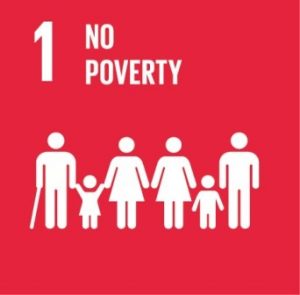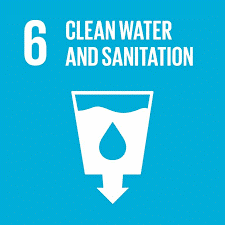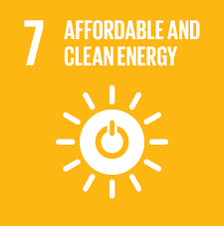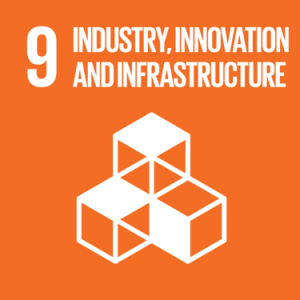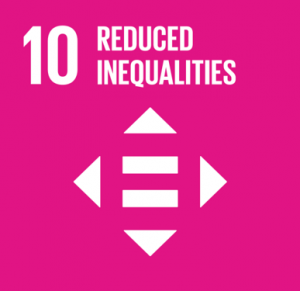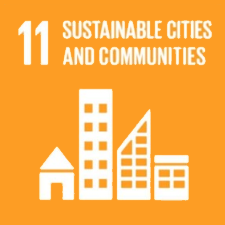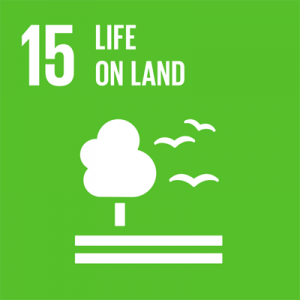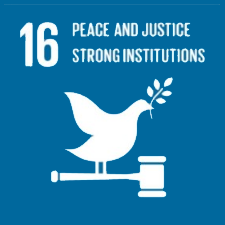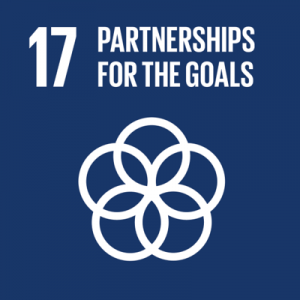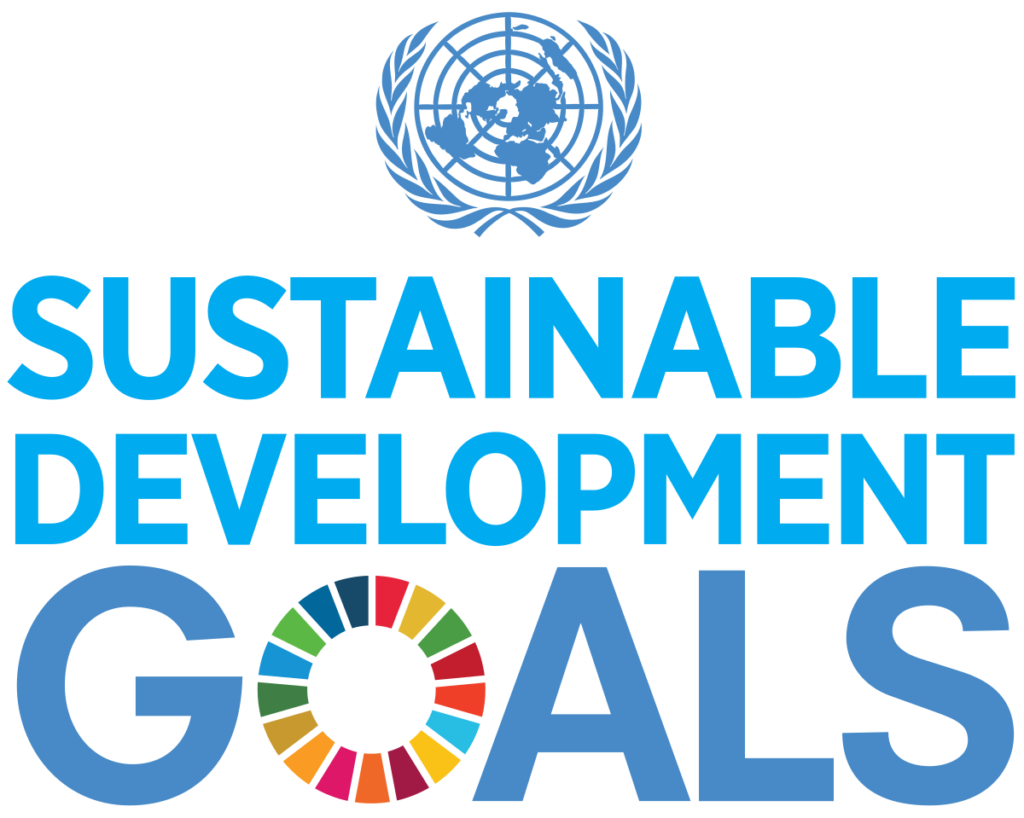SUSTAINABLE DEVELOPMENT GOALS
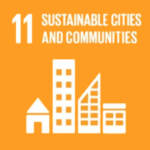
SDG 11: SUSTAINABLE CITIES AND COMMUNITIES
“Cities and communities must themselves be sustainable. More and more of the world’s population lives in urban centres, and this is often the home of our universities too. Cities can be places of great innovation and opportunity, but they can also be home to intense poverty and inequality. The interaction between universities and their communities, urban and rural, needs to be a positive one that can last for generations.”
(THE Impact Rankings)
Support of arts and heritage
IPB University provides public access to buildings, monuments, or natural heritage landscapes of cultural significance.
There are several natural heritage objects for agrotourism at IPB University:
- IPB Baranangsiang Bogor Campus Historically, the building was established in 1952, prior to the establishment of IPB in 1963.
- Gedung Pusat Studi Biofarmaka (Tropical Biofarmaka Research Center) was established in 1926.
- Asrama Sukasari was established before 1950.
The IPB Baranangsiang campus is one of Bogor’s cultural heritages because it has a history stored in it. In that building, the groundbreaking was carried out by the first president of Indonesia, Ir. Sukarno. At that time, Ir. Sukarno emphasized the importance of agriculture to the Indonesian people as a matter of life or death.
<<IPB University Campus Baranangsiang, the Cultural Heritage at Bogor City>>

Gunung Walat Educational Forest is one of the forests managed by the Faculty of Forestry and Environment of IPB since 1968. It was originally an enclave surrounded by villages and community gardens. Besides being used as an educational forest, Gunung Walat Forest is also a source of energy. community income around the forest. Gunung Walat Forest can be accessed by people who want to do research or studies related to nature.
<<Gunung Walat University Education Forest>>
Education and Tourism Development at IPB University
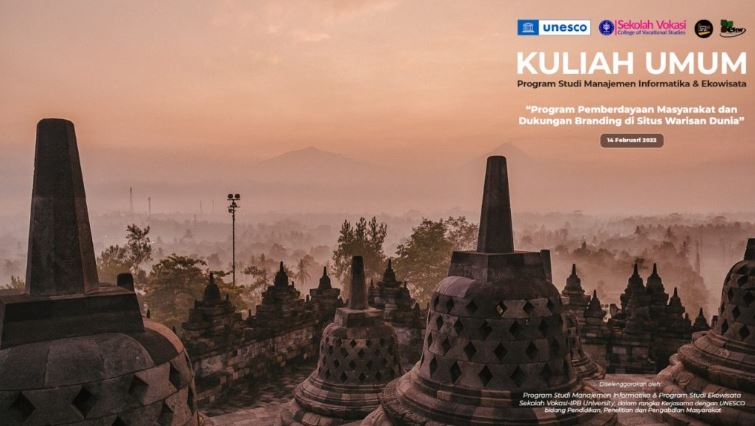
In 2022, IPB Vocational School and UNESCO Jakarta held a public lecture: “Community Empowerment Program and Branding Support at World Heritage Sites (February 14, 2022). This public lecture also aimed to establish collaboration in developing and strengthening communities in 20 villages around Borobudur Temple. This collaboration begins with mapping the potential in the Borobudur area to develop creative industrial products and cultural products around the world heritage area, namely the Borobudur Temple. The collaboration will be documented in an e-book.
<<Public Lecture: Support for World Heritage Sites>>
Summer Course “Tempe: Indonesian Cultural Heritage for The World”
The Department of Food Science and Technology at IPB University held a summer course entitled “Tempe: Indonesian Cultural Heritage for the World”. Tempe is the only processed soybean product that is native to Indonesian cultural heritage. Meanwhile, tofu, soy sauce, tauco, and others are foreign cultures adopted by the community. Based on Serat Centhini, tempeh culture has been known since 400 years ago. The word “tempe” first appears in Serat Centhini, which describes the life of Javanese society in the 16th century. Serat Centhini has written several types of Tempe-based dishes, such as ‘Kadhele Tempe Srundengan’, ‘Brambang Jae Santen Tempe’, and “Sambel lethokan.”
<<Introducing Tempe, Cultural Heritage of Indonesia to the World>>
IPB University Library has a repository website that has become the best repository in Southeast Asia that has public access. Its management is supported by the Information and Communication Technology (ICT) department of IPB University.
Open Access to IPB University’s Library (Free)
IPB University Library services include membership, borrowing, returning books, information retrieval, user guidance, references, discussion rooms, internet services, SNI Corner, BI Corner, photocopying, and scanning. OPAC is a search tool that can be used to search for information. The library lobby is provided for visitors to read books and do assignments, discussions, and exhibitions while maintaining order, security, and comfort. The number of visitors to the IPB University library is an average of 2 million every month. Since 2019, IPB, in collaboration with Bank Tabungan Negara (BTN), has conducted the inauguration of the BTN Zone at the IPB Library, which functions as a reading room that is expected to provide more benefits to visitors, both academics and the public.
<<Open Membership at IPB University’s Library>>
<<List of Open Access University’s Repository in Indonesia>>
<<E-resources at IPB University>>
<<Guidelines to Access e-resources at IPB University>>
In 2022, IPB, in collaboration with the Corruption Eradication Commission, inaugurated the KPK Corner to disseminate literacy about anti-corruption, inspire various innovations, and commit to building integrity. IPB University Library also has e-resources that collaborate with other publishers to provide digital access.
IPB University provides public access to museums, exhibition spaces, galleries, and/or works of art and artifacts.
Museums and galleries at IPB University
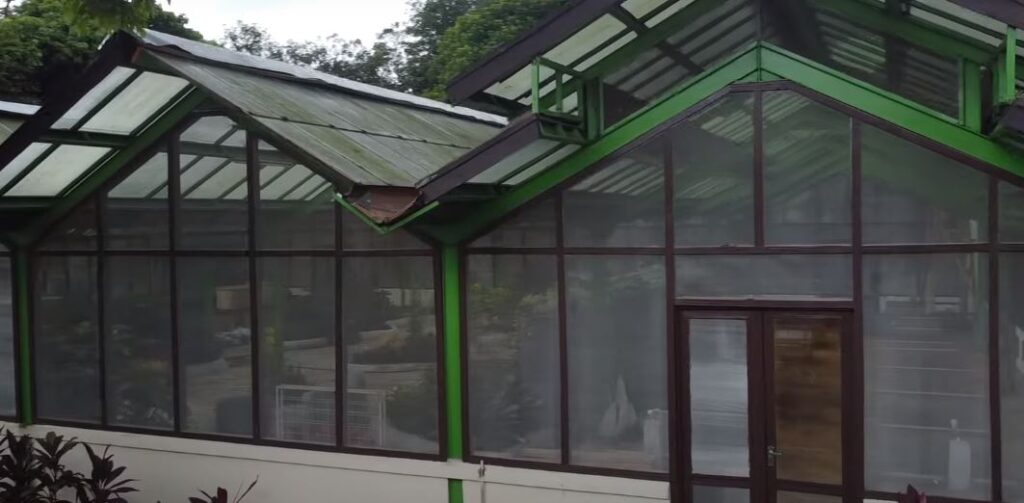
IPB University has several museums, galleries, and works of art or artifacts. Since 2005, IPB has established an insect museum, organized by the Plant Protection Department, Faculty of Agriculture. The Insect Museum introduces and provides knowledge about insect diversity, especially insect taxonomy, to school students, college students, and the public. In 2022, IPB initiated the construction of the IPB Museum. Those museums are open to the public for free.
<<Indoor Garden Landscape at IPB University>>
<<Infrastructure Profile of IPB University>>
IPB University also has some exhibition spaces and galleries in departments or programs, such as the Gallery of Landscape Architecture, which is located inside the Department of Landscape Architecture and has free access during student exhibitions twice a semester. IPB Campus also has the same artifacts, since IPB Dramaga Campus previously was a rubber plantation since Dutch colonialism.
As a public university, IPB University provides public access to open space and green space within the Darmaga campus, such as Campus Forest Park, Taman Konservasi, Academic Event Plaza (AEP), Taman Inspirasi, Taman Integritas, Taman Inovasi, etc. IPB University also has blue open spaces (BOS) within the Darmaga Campus, such as LSI Lake (Situ Leutik), Situ Burung Lake in Cikarawang, Telaga Inspirasi, etc. The green open space (GOS) and blue open space (BOS) are open to the public. Therefore, on the weekends, e.g., Saturday and Sunday, many visitors use it as a recreational object. Those visitors mostly came from communities surrounding IPB Campus Dramaga. IPB University develops many GOS and BOS, which are free to the public. In the 1669 ha of campus area at IPB University, 96% of the total area is open space.
<<Open Spaces at IPB University>>
<<IPB Sustainability Infographic, p. 4>>
Green Open Space
Campus Forest Park was established in 2018. Establishing a Campus Forest Park on the Dramaga Campus of IPB was marked by issuing the Rector’s (i.e., Chancellor Professor Aman Wirakartakusumah) Decree No. 086/Um/1995. It entrusted its management to the Faculty of Forestry. The area designated by the decree is 12 hectares, and at that time, mahogany (Swietenia sp.) and pinus (Pinus sp.) were planted as currently seen in the Cikabayan block area. On October 13, 2022, IPB collaborated with United Tractors. Fifteen thousand trees were planted in the IPB Campus Forest Park as a carbon sequestration effort in the form of seven types of trees: meranti, honey jackfruit, pearl guava, matoa, binjai rambutan, kemang, and red guava. This type of plant was chosen because it has a very high carbon absorption capacity, and the fruit produced has the potential to improve the economy of the local community. IPB with volunteers from PT. Mandiri Sekuritas, BPDAS Citarum-Ciliwung, and Civitas Faculty of Forestry and Environment IPB University carried out the Foster Tree Planting activity of 400 tree seedlings, including rambutan, jackfruit, avocado, matoa, and durian trees.
<<Water, Energy, and Infrastructure at IPB University 2022>>
<<Conservation Park at IPB University>>
<<Tree Planting at IPB University>>
Blue Open Spaces
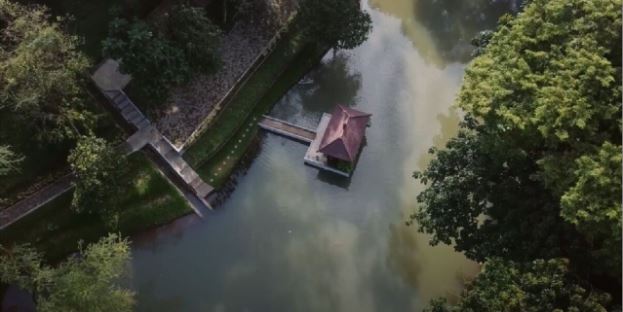
Since March 16, 2021, IPB and Danone Indonesia, through PT Nutricia Indonesia, have inaugurated Taman Kehati (IPB Inspiration Lake). This park is one of the supporters of biodiversity conservation, has an area of 14 ha, and is located on the Dramaga IPB Campus, Bogor. This collaboration aims to conserve endemic flora and fauna that are endangered, as well as carry out the mission of meeting the needs of healthy food and access to clean water for IPB University residents. In Kehati Park (IPB Inspiration Lake), there are various rare animals, such as leopard cats, mongooses, kekes squirrels, kingfishers, and coconut squirrels. Meanwhile, the flora found in Telaga Inspirasi includes aprika trees, walnut trees, rubber trees, kebo rubber trees, various types of bamboo, and mahogany trees.
Danau SDGs (or SDGs’ Lake) is one of the IPB University’s best-kept secrets. Located inside the Darmaga Campus, this was built in order to emphasize IPB University’s commitment to achieving the SDGs. This lake functioned as a water conservation and tourism program. In 2022, IPB University was awarded as the first winner in the implementation of the SDGs at the Indonesia SDGs Action Awards organized by the SDGs National Secretariat and the Ministry of National Development Planning (Bappenas). Inside the campus, there are four other lakes that function as water conservation and water treatment. The lake area is equipped with jogging tracks, photo spots, meeting halls, and materials for introducing SDGs values around the lake area. The new jogging track, which surrounds the lake on campus, allows visitors to not only go around but also to maintain their health by taking time to exercise.
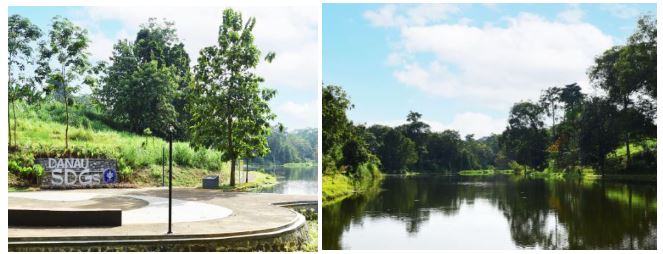
IPB University has many annual public performances, such as choirs, theatre, orchestra, sports, music, art exhibitions, etc. Related to art and culture that plays an important role in cultural preservation as well as providing space for the actualization of arts, especially for IPB academics: (1) Gebyar Nusantara, an annual event that presents IPB University students’ cultural diversity from all over Indonesia; (2) IPB University Student Choir. There are three groups, including the Student Choir (PSM), which consists of undergraduate students; D’Voice, which consists of IPB Vocational School students; and Agriaswara, which has received many national and international achievements. Agriaswara raised the International Mission in Art and Culture (IMAC) on an international scale in dance and music. (3) The Sundanese Arts Circle (Lises) Gentra Kaheman, which is engaged in arts and culture, especially Sundanese arts and culture; and (4) Music Agriculture X-Pression (MAX), which focuses on efforts to improve the art of music at IPB.
Gebyar Nusantara
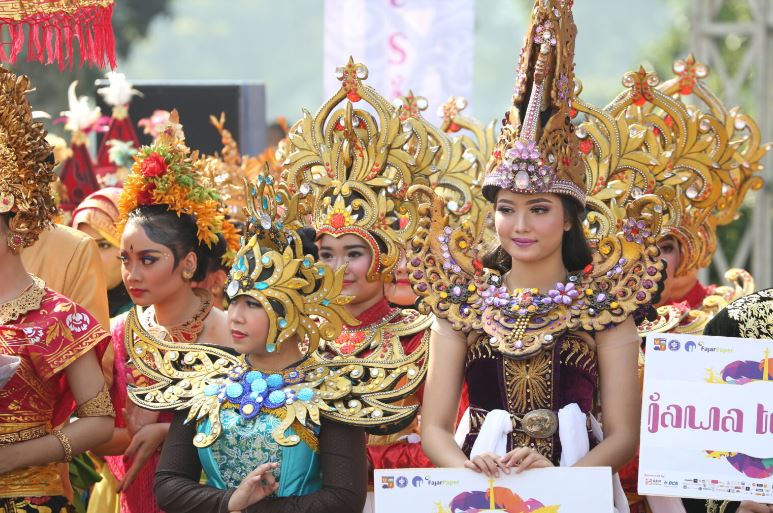
IPB University students come from various regions of Indonesia. This makes the IPB University campus rich in culture. This uniqueness is expressed in a performance called Gebyar Nusantara, which is held annually. Gebyar Nusantara is a gathering place and competition between regional student organizations in carnival wraps, traditional costume competitions from the region, regional culinary specialties, and stand competitions. The existence of Gebyar Nusantara is a pleasant moment for students from the region to gather, build solidarity and feel the atmosphere of “home”.
Agriaswara and D’Voice Student Choir
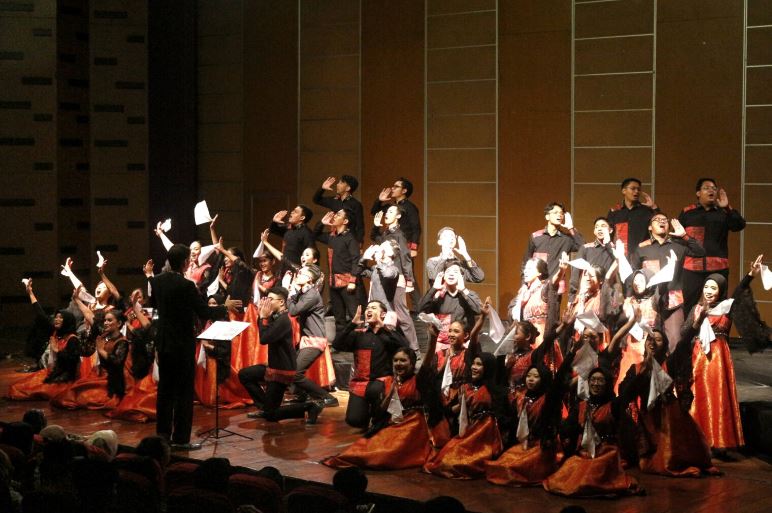
The Student Choir (PSM) of IPB University Agriaswara is a Student Activity Unit (UKM) at IPB University that consists of undergraduate students. While D’Voice is a student choir consisting of students from the IPB University Vocational School,
Agriaswara has carved out a lot of activities and achievements, including regularly holding annual concerts. The Agriaswara Annual Concert was held to introduce choral music from various ages to the Indonesian audience. Agriaswara raised the International Mission in Art and Culture (IMAC), a mission to make Indonesia famous by participating in an international choir competition while introducing Indonesian culture to the international scene through regional music and dance. Several achievements continue to be carved by Agriaswara, including the Golden Diploma and Silver Diploma in Folklore and Mixed Choir categories in various world competitions, including in Germany, Hungary, Ireland, Switzerland, Italy, Finland, Belgium, and other countries.
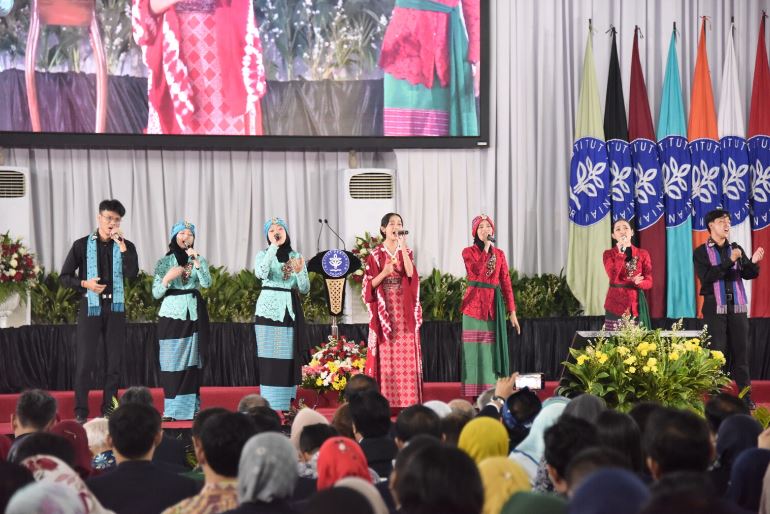
Likewise, D’Voice, which continued to make international achievements, included Winner of the Folklore Category, Gold Prize for the Mixed Choir Category, and Special Award for Authentic Interpretation of Folk Song at the International Choral Festival and Competition in Prague, Czechoslovakia.
Gentra Kaheman
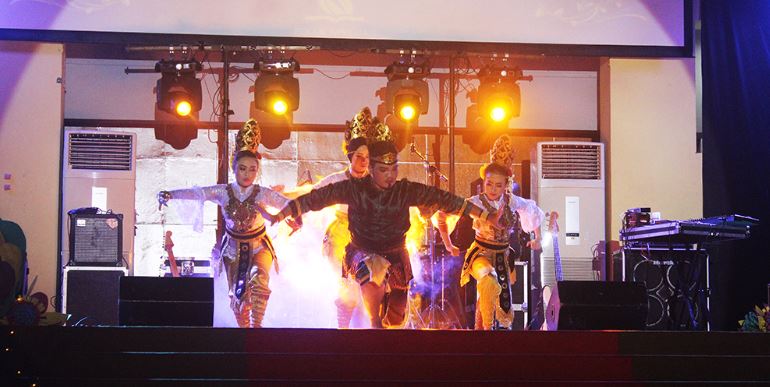
Lingkung Seni Sunda (Lises) Gentra Kaheman of IPB University is a Student Activity Unit (UKM) that is engaged in developing student interests and talents in the arts and culture, especially Sundanese arts and culture. Gentra Kaheman is a member of the Sundanese Student Arts Circle Communication Forum (Fokalismas) which is directly under the coordination of the Office of Tourism, Arts and Culture of West Java Province. Gentra Kaheman’s existence has also been recognized as one of the Sundanese art studios in Bogor under the coordination of the Bogor City and Regency Information and Culture Service Office. In addition to routinely holding internal performances at the IPB University level, Gentra Kaheman is also active as a cultural performer at various national-level activities.
Music Agriculture X-Pression (MAX !!)
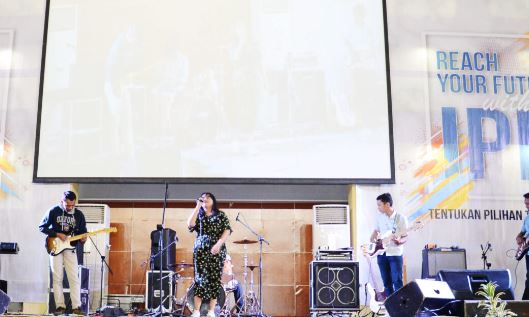
Music Agriculture X-Pression (MAX !!) Student Activity Unit (UKM) is a UKM that focuses on efforts to improve music art in IPB University. MAX is a means for students to share knowledge, work, and sharing related to music and event organizers. UKM MAX consists of three divisions namely General Affair (GA), EO, and Flavalicious MAX Music Percussion. The achievement achieved by Flavalicious MAX Percussion was getting MURI in 2007 in the mass guitar-playing category with over 500 players. This performance played a song titled “Rumah Kita” and managed to win two contests between students.
Student Art Performance
- IPB Art Contest 2022
The biggest art party at IPB University, the IPB Art Contest (IAC), officially opened on 8/5. The annual event broadcast on the YouTube channel of the Student Executive Board – Student Family (BEM KM) IPB University carries the theme “Express Your Glory in the Beauty of Artperience.” The 2022 IPB Art Contest consists of 15 contests that are classified into several categories, namely vocal, multipart, literature, and showcase. The competition will be attended by the best representatives from each faculty and school at IPB University. There are 15 competition poles.
<<IPB Art Contest 2022>> - Agria Swara Concert 2022
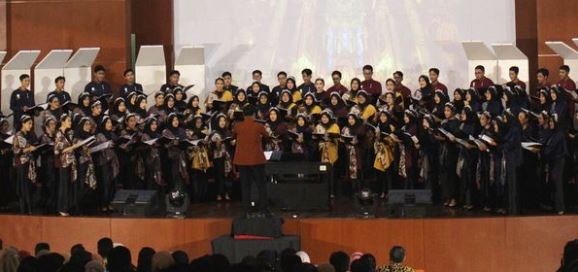
Internal Concert IX PSM IPB Agria Swara was held on Saturday, November 19, 2022. This internal concert entitled “Nuansa: Shining Again with Glory” sheds new light on this magnificent performance after a period of dimness swallowed up by the pandemic. This concert was held directly at the FEM IPB University Auditorium and witnessed by more than four hundred spectators.
<<Agriaswara Concert 2022>> - Gold Medal at the 11th Bali International Choir Festival (BICF)
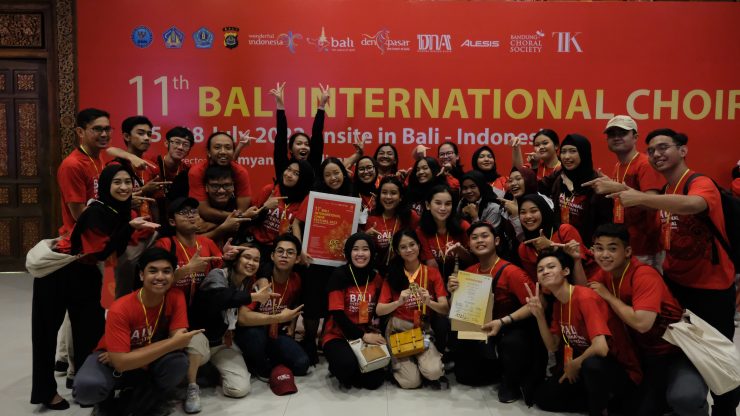
The IPB Agria Swara Student Choir (PSM) once again made IPB proud by winning the gold medal at the 11th Bali International Choir Festival (BICF), which was held at the Dharma Negara Alaya Building, Denpasar, Bali. PSM IPB Agria Swara sent one team to compete in the mixed choir category out of the 10 competition categories being contested. The Sing for Youth International Competition (SYNC) team consisted of 32 singers, namely 12 male singers and 20 female singers, who had gone through a series of auditions and were followed by 2 official companions and 1 conductor.
IPB University supports the preservation of cultural heritage and traditions on campus. Each year’s various activities include learning, preserving, and developing regional dances, songs, musical instruments, theater arts, folk tales, and traditional games.
IPB Science Techno Park
IPB managed parts of the Taman Kencana and Bogor areas by establishing the IPB Science Techno Park. Historically, the Taman Kencana area has been among the Dutch colonial government’s heritage since the colonial era. Taman Kencana initially functioned as Dutch noblemen residents, with typical Dutch house architecture. To date, some buildings that have been standing since the Dutch colonial era are maintained and conserved, including parts of the IPB Science Techno Park properties.
<<IPB University: Taman Kencana Campus>>
IPB Baranangsiang Campus
One of the IPB campus locations is the IPB Baranangsiang Campus in Bogor, which is among the Bogor region’s cultural heritage. Historically, the building, which currently functions as the IB Baranangsiang Campus, was established in 1952; meanwhile, the establishment of the Institut Pertanian Bogor (Bogor Agricultural University, IPB) was begun in 1963. The first stone lay-down of the IPB Baranangsiang building was done by the first President of Indonesia, Ir. Soekarno, on April 27, 1952.
<<IPB University: Baranangsiang Campus>>
Gebyar Nusantara Festival 2022
Gebyar Nusantara is the implementation of cultural love by IPB University students. This year’s Genus event was attended by at least 27 regional student organizations (Omda) from various regions of the country. Genus is also an opportunity for Omda to introduce the culture of their respective regions.
In 2022, the opening of Gebyar Nusantara (Genus) IPB University 2022 was held on Saturday, September 3, 2022, at the Grha Widya Wisuda Building. After that, there was a series of Cultural Talk events with the topic “Gemerlap Lanterns of the Archipelago” presenting the keynote speaker, namely Dr. Sandiaga Uno, Minister of Tourism and Creative Economy (Kemenparekraf), RI. Followed by an introduction to the OMDA, Indonesian culinary delights, cultural exhibitions, and a documentary short film competition. This year, Genus can facilitate the preservation of Indonesian regional culture and introduce it to a wide audience offline after the impact of COVID-19. At the closing ceremony of Gebyar Nusantara 2022 which was held on September 25, 2022, a total of 27 regional student organizations (omda) demonstrated their respective regional cultures, which were packaged creatively at the biggest cultural festival at IPB University.
<<Gebyar Nusantara Festival 2022>>
<<Water, Energy and Infrastructure Report 2022: Art Performance>>
Gentra Kaheman
IPB conserves the Sundanese-West Javanese native tribe culture through the Gentra Kaheman student organization. Gentra Kaheman is a student organization that focuses on IPB students’ interests and talent development in arts and cultures, especially Sundanese art and culture. Art and cultural variety are learned, conserved, and developed in the form of local dances, songs, musical instruments, theatrical/drama arts that bring local folks’ lores, and traditional games.
<<Gentra Kaheman: performance in ISSAAS – SEAPRO 2022>>
Agriaswara Annual Concert 2022
Internal Concert IX PSM IPB Agria Swara was held on Saturday, November 19, 2022. This internal concert entitled “Nuansa: Shining Again with Glory” sheds new light on this magnificent performance after a period of dimness swallowed up by the pandemic. This concert was held directly at the FEM IPB University Auditorium and witnessed by more than four hundred spectators.
Sustainable practices
IPB University has a program Green Campus as stated in Rector IPB Decree number 205/IT3/LK/2015 concerning the implementation of the Green Campus 2020 Movement (page 2) and also stated in Rector IPB Decree number 104/IT3/LK/2019 concerning IPB green campus criteria 2019-2023 (page 2). Green transportation and pedestrians implemented throughout 2015 to 2023 is one of four main activities carried out to achieve the goals of a green campus.
In 2022, the green transportation movement is carried out in the following stages: 1. Electric vehicles (approximately 711 people per day). 2. Bicycle use, in which IPB has 643 bicycle units with connectivity in the campus area, reaching 70% (around 78 units/day). 3. Development of pedestrian paths, with connectivity reaching 80% of the total campus area. Since 2017, IPB has provided two pedestrian paths: 4. Restricting of a parking area for vehicles, which requires IPB members to cultivate walking habits in addition to creating traffic order and security; 5. Providing pedestrian paths designed for safety and comfort, and in some parts, providing disabled-friendly features; 6. Use of gas-fueled buses: in 2017, IPB added five BBG units in collaboration with PT Sinarmas. The natural gas-fired IPB buses are used daily by around 1,918 people.
<<Travel and Commuting IPB 2022 (Scope 3) p. 6–8>>
The impact of this Green Campus program is the use of transportation with low emissions during 2020–2022. IPB University’s carbon emissions measurement in 2022 is equivalent to 0.46 metric tons per year per person, based on the 2022 climate action plan sustainability report (page 4).
<<Water, Energy and Infrastructure Report 2022 (p. 2 and p. 13-16)>>
IPB University undertakes actions to promote more sustainable commuting by the provision of free buses or shared transport schemes, provision of bicycle parking & storage facilities, provision of cycle tracks, a bicycle and pedestrian plan or policy, bicycle sharing program, free or reduced price transit passes, car/vanpool or ride sharing program, reduced parking fees or preferential parking for carpool or vanpool users, car sharing program, provision of electric vehicle recharging stations, preferred parking for fuel-efficient vehicles.
<<Water, Energy, and Infrastructure Report 2022, p. 2 and p. 13–15>>
Provision of Free Buses

There are eight campus buses operating within the campus area, and they have full AC facilities. All bus units operate on campus from 06.00 to 18.00 WIB under normal conditions. Operational days are Monday–Friday, except campus holidays and national holidays. Campus buses can only pick up and drop off passengers at designated bus stops.
<<Bus Tracking at IPB University>>
<<Bus Schedule and Bike Facilities>>
Provision of Pedestrian paths and bicycle lanes
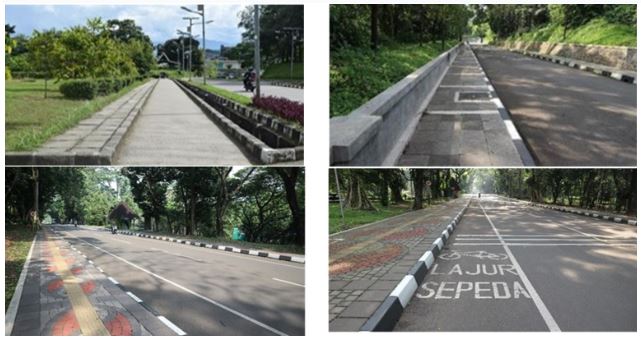
Provision of free bicycle rental
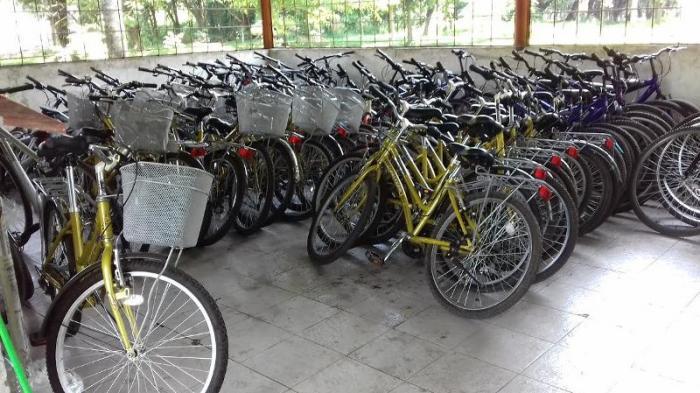
The IPB campus has long had a culture of cycling. With the help of various parties, IPB has more than 700 bicycles that can be used as a means of transportation on campus every day. There are various types of bicycles available. There are types of bicycles that have baskets for storing things and are very comfortable for women to use, such as Sierra and Vista, but there are also mountain bikes or heist bicycles that are physically bigger and are preferred by men and women in general. In total, there are eight types of bicycles operated by the green transportation team.
Provision of Electric Car Transportation

Provision of Electric Bicycles
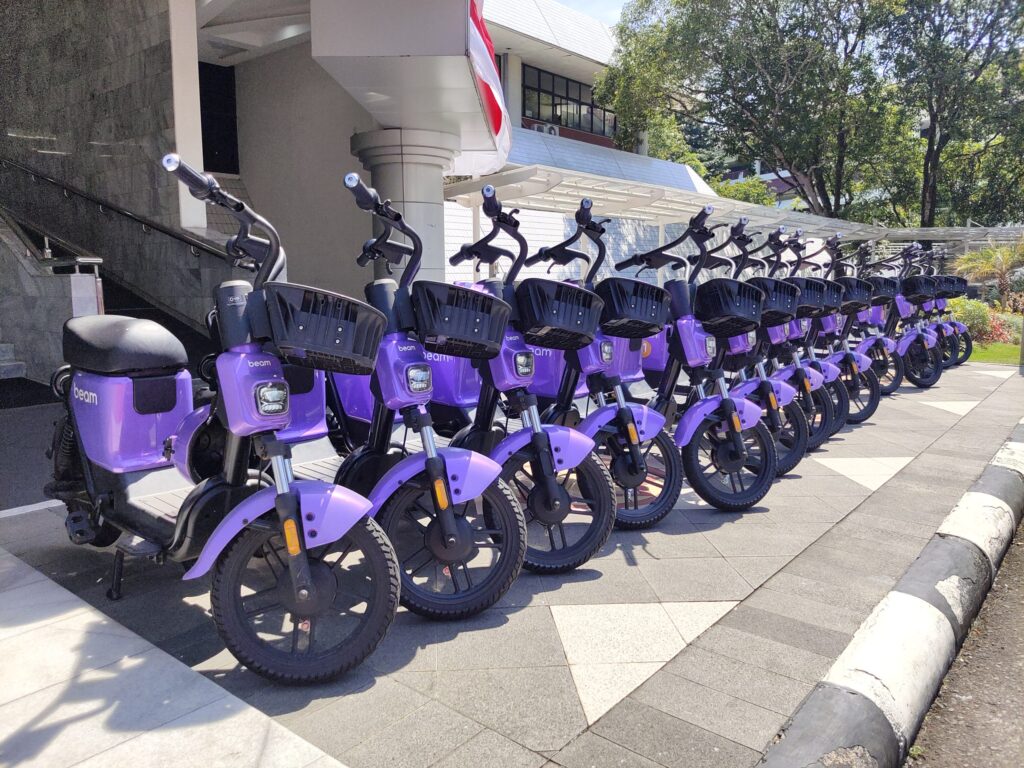
Since 2020, IPB has promoted or allowed remote working for employees to reduce employee commuting, as stated in IPB Official Letter No. 6494/IT3/KP/2020 concerning the Employee Work System during the New Normal Era.
IPB University has also implemented a picket (shifting) schedule since 2020 and is still running until now. There are shifts; some are work-from-home (WFH), and some are work-from-home (WFO). Some jobs are communicated via e-letter, digital sign, and social media; this can reduce the use of paper materials, photocopies, printed materials, and others. Important meetings, even lectures and practicums, are also held online.
In addition, IPB University also promotes an online learning system through blended methods, which reduces classroom utilization and transportation for lecturers and students to come to campus. The blended learning is delivered through the Moodle Platform (class.ipb.ac.id) and the Zoom Online Meeting Application, which provides a licensed account for all students and lectures.
As an educational institution, IPB University pays attention to the housing needs of its lecturers and employees. This commitment is shown by the availability of 106 housing units for lecturers inside our campus, with a total area of 7,041,610 m2. In addition, IPB University also provides a unit of lecturer dormitory on Jl Veteran No. 60 Bogor; on Jl Kartini Bogor; and around IPB Baranangsiang Campus, Jl Andi Hakim Nasoetion Bogor. For every lecturer and employee who was in need, IPB University gave a permit for the employees and lecturers to use this housing.
<<Policy on Housing Support for Employee>>
IPB provides affordable dormitories for students inside the campus area. IPB University has 10 building dormitories, which include 4 male student dormitory blocks and 6 female student dormitory blocks. For first-year students, the existence of a dormitory greatly facilitates access to the location of classes and practical work, namely the Common Classroom (CCR) and Teaching Laboratory, which are very close to the location of the dorm. Facilities available at the dormitory include 7×24-hour security, a study room, a lobby, free WIFI, a dormitory canteen, and assistance from the Senior Resident (SR).
<<Affordable Dormitories for Students>>
Dormitory Facilities
for First-Year Students: General Competency Education Program (PPKU) of IPB University
The dormitory of the General Education and Competency Program of IPB University is a supporting unit of learning activities specifically for first-level students. The dormitory building consists of 10 buildings, which include 6 female dormitories and 4 male dormitories. For first-year students, the existence of dormitories greatly facilitates access to the location of classes and practical work, namely the Common Classroom (CCR) and Teaching Laboratory, which are very close to the location of the dorm.
Facilities available at the dormitory include 7×24-hour security, a study room, a lobby, free WIFI, a dormitory canteen, and assistance from a senior resident (SR).
Around the dormitory environment are also automated teller machines (ATMs), Agrimart, printing, and photocopying facilities so as to facilitate access for students to support their daily lives.
Aside from dormitories for first-year students who are still in the General Competency Education Program (PPKU), IPB also provides dormitories for upper-year students, which are Sylvasari Dormitory and Dramaga Girl Dormitory (APD).
Dramaga Girl Dormitory (APD)
Dramaga Girl Dormitory (APD) is located inside IPB Campus Dramaga. Aside from being used as a residence, in this dormitory, they also do activities to develop various soft skills in the students.
Sylvapinus Boy Dormitory
Sylvapinus Dormitory is inhabited by students from various faculties on the Dramaga campus. There are various facilities like a farming field, sports field, library, TV watching room, honesty store, kitchen, praying room, etc. The activities of this boy dormitory focusing on social and environmental fields. The biggest activity held by the residents is Bogor Green Sounds for the Earth, which’s a series of love the environment activities coordinated with several environmental communities in Bogor combined with a music competition on the Bogor level. Other than that, Sylvapinus residents also attend various activities, like becoming campus volunteers and joining activity committees in lecturer housing.
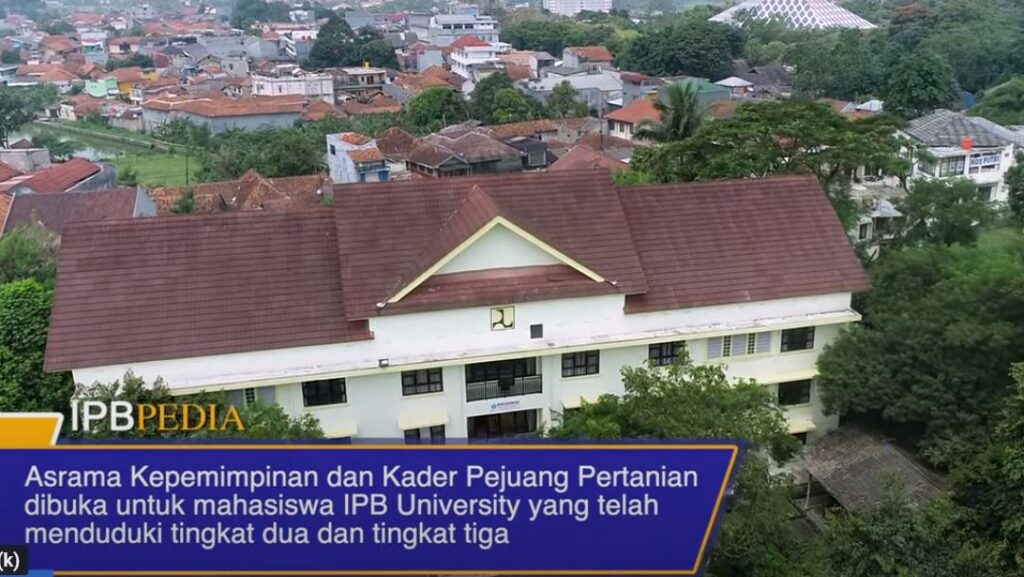
IPB also provides leadership dormitories, provided by sophomore students onward, with the aim of helping students find affordable housing.
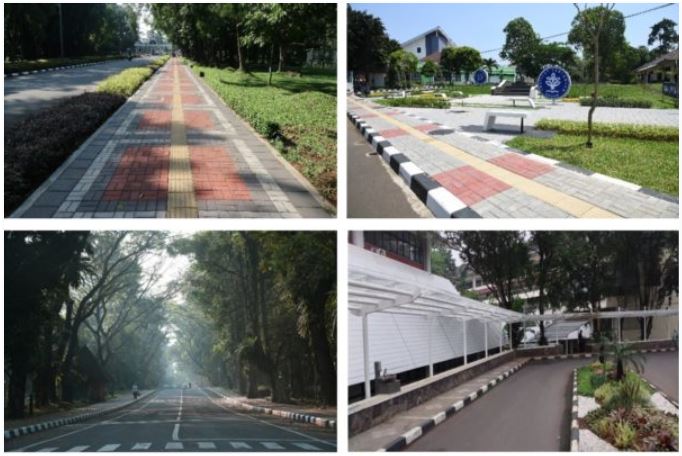
IPB provides pedestrian paths in the entire campus area, and new pedestrian tracks are provided around strategic and high-mobility locations. Pedestrian paths also provide additional facilities, such as special blocks for people with disabilities. IPB also invites all Civitas to take a walk to support the green campus program.
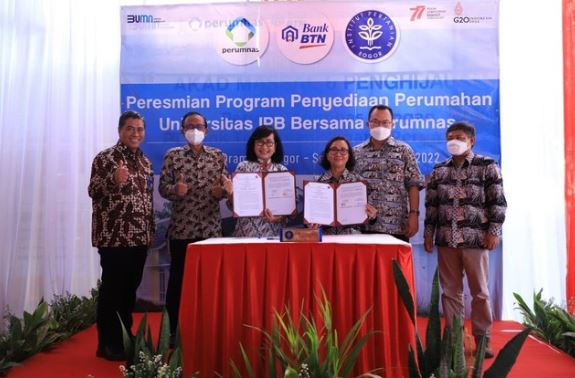
IPB University works closely with local and national governments to address planning issues and development, including ensuring that local residents are able to access affordable housing. In collaboration with Perumnas and the Ministry of General Affairs, IPB University provides affordable housing to local communities surrounding the campus area.
<<Collaborate to Provide 160 Cheap Houses for Employees>>
<<PERUMNAS Cooperates with IPB University to Provide Housing for Lecturers and Employees>>
<<Perumnas Collaborates with IPB to Provide Housing for Educators>>
IPB University also works with the Public Service Agency (BLU) Center for Housing Financing Fund Management (PPDPP) Ministry of Public Works and Public Housing (PUPR) to study and analyze the social and economic impacts of distributing program funds for the Housing Financing Liquidity Facility (FLPP) on low-income communities (MBR) through banks and developers. Program funds for the Housing Financing Liquidity Facility (FLPP) help people in low-income communities address the problem of housing.
IPB University applies sustainable building standards toward a green campus. In collaboration with the Green Building Council Indonesia (GBCI), IPB has prepared old and new buildings that are environmentally friendly, low-carbon, and produce oxygen.
<<Succeeding Green Campus IPB University Partners with Green Building Council>>
<<Assessment of the Implementation of Greenship New Building for AM Satari IPB Bogor Building >>
<<Water, Energy, and Infrastructure Report 2022: Green Building, p. 17–18>>
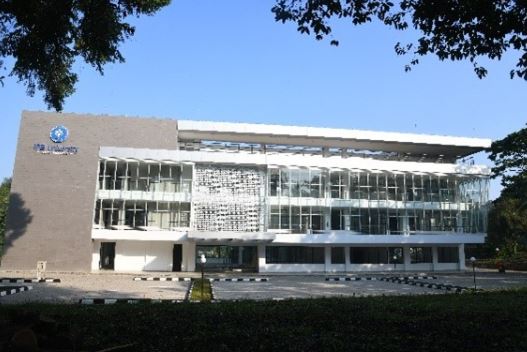
IPB University officially inaugurated the Delta Building in the Vocational School. Delta Building is an ex-biochemistry building that was renovated by the university to become a modern agricultural storefront. IPB is now trying to renovate the building to become an urban agriculture complex. We named it Alpha Building, CB Building (Beta), CC Building (Gama), DD Building (Delta), Epsilon Building, Zeta Building, and later, many more can reach Omega. IPB University also has a new building on brownfield land, the AM Satari Building. AM. Satari Building applies an environmentally friendly concept to the principle of green building. The building is also supported by facilities and designs that support energy efficiency. The AM Satari building has a water harvesting system that supports water needs in one building.
<<Delta Building: Renovation of Ex-Biochemistry Building>>
In 2022, IPB conducted a study of the green building aspects of the Delta Building and AM Satari Building.
SDG 11 IN NUMBER
Rp 1,296,470,000,000
University expenditure
Rp 4,566,500,417
Expenditure spent on supporting arts and heritage
0.18
Percentage of spend on Arts & Heritage
RELATED NEWS
It seems we can't find what you're looking for.

